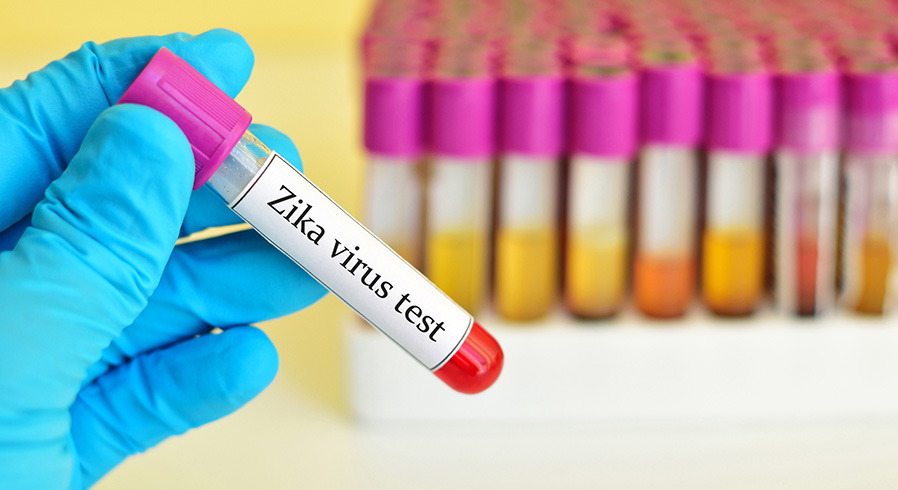There’s a lot of scary buzz around the Zika virus lately. But how dangerous is it really? To make sure you’ve got your bases covered without slipping into paranoia, we went to the experts to get a handle on what you need to know and what you should (and shouldn’t) be worried about.
1. You Can Get It from Having Sex
Theoretically, at least. According to the New York Times, there are currently two documented cases of Zika being found in semen and one documented case of the virus being transmitted sexually. This isn’t enough for the CDC to issue a warning, but–like all things sexual–better safe than sorry. “Until more data and literature is available, being cautious is the best step at this time,” says Sonpal. “If you are traveling in those regions, and/or think you have been infected, see your doctor first–and then remember [to] practice safe sex with barrier devices like condoms for several weeks thereafter.”
2. Tropical Areas Are Hot Spots for the Virus…
Zika is part of a class of viruses known as flaviviruses, which are spread by infected mosquitos. Zika is spread by the Aedes mosquito, which is known for biting in the daytime and having a particular thirst for humans. The Centers for Disease Control and Prevention (CDC) has issued travel warnings for much of Central and South America and the Caribbean (view the full list), but if you are travelling to these hot spots, you’ll need to layer on extra precautions. The CDC recommends using a repellant containing DEET, picaridin, IR3535, or lemon-eucalyptus oil to keep yourself protected. If you’re using both sunscreen and repellant (which you probably will be in these tropical areas), make sure to apply the repellant after the sunscreen for the best protection.
3. But It’s Traveling Around the Globe
One of the downsides of having the ability to jump on a plane and jet off to a far corner of the world is that diseases spread a lot quicker. The Zika virus originated in Africa, and just eight short years ago, there were only a few documented cases of the virus in humans. “In 2014, the virus spread eastward across the Pacific Ocean to French Polynesia, then to Easter Island, and in 2015 to Central America, the Caribbean, and South America, where the Zika outbreak has reached pandemic levels,” says Niket Sonpal, M.D., associate clinical professor at Touro College of Medicine in New York. The virus is currently present in 22 countries and territories across the Americas and is expected to spread to the U.S. (and every other country in the Western hemisphere where Aedes mosquitos live), according to the Pan American Health Organization. Heed the CDC warnings, and take extra travel precautions to help stop the spread.
4. Not Everyone Who Gets Infected Gets Sick
According to the CDC, only one in five people who contract the disease will actually get sick. Symptoms usually show up two to seven days after the initial infection, so you might not even know you have it. Of course, the downside of this is that many people are carrying the virus without knowing. If there’s any chance you might have it (i.e. you got a mosquito bite or traveled to someplace on the CDC’s list), make sure you keep yourself protected for a full week after. The virus spreads when a mosquito bites an infected person and then bites someone else. Keep up the repellant routine for at least a week.
5. It’s Actually Not That Bad for Most People
Despite all the panic and scary headlines, Zika is a pretty mild virus for most people who contract it. The most common symptoms are not unlike that of the flu: fever, rash, joint pain, and conjunctivitis (red eyes) are all pretty normal and typically last about a week. According to the CDC, deaths and hospitalizations are super rare for otherwise healthy people who contract it.
6. It’s Easy to Treat
There’s no vaccine or medication for the Zika virus, but as long as you’re otherwise healthy, that’s nothing to panic over. The CDC (and your mom) recommends plenty of rest and fluids. If you don’t start feeling better after a few days, Sonpal recommends checking in with your doctor. One thing to note: You should stay away from aspirin and ibuprofen (which are part of a class of non-steroidal anti-inflammatory drugs known as NSAIDs) since they act as blood thinners. Dengue fever is carried by the same type of mosquito and causes a high risk of hemorrhaging, so on the off chance you have dengue and not Zika, thinning your blood is bad news.
7. Zika Can Be Dangerous for Pregnant Women and Their Babies
Even though the virus is NBD for most of us, it can be seriously threatening if you’re pregnant. A mother who contracts the virus before giving birth can pass it to her newborn during delivery, but the real threat is birth defects. The major concern is microcephaly, a condition that causes a baby’s head and brain to be smaller than normal. Other than the physical defect, microcephaly is often associated with developmental delays, seizures, and intellectual disabilities. In late December, Brazilian health officials even warned women not to get pregnant, since 2,400 babies had been born with the condition in 2015, according to CNN. If you are pregnant, all of those anti-mosquito precautions and travel warnings become super-vital.


